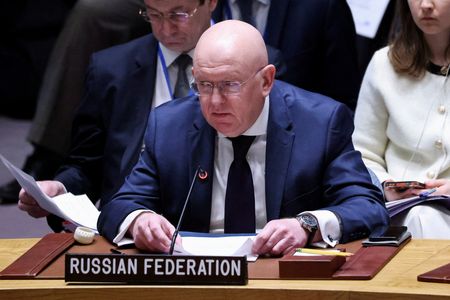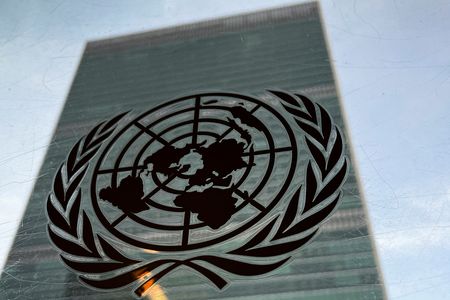By Michelle Nichols
UNITED NATIONS (Reuters) -Russia on Thursday vetoed the annual renewal of a panel of experts monitoring enforcement of longstanding United Nations sanctions against North Korea over its nuclear weapons and ballistic missile programs.
The move comes amid U.S.-led accusations that North Korea has transferred weapons to Russia for use in its war in Ukraine. Both Moscow and Pyongyang have denied the accusations, but vowed last year to deepen military relations.
“This is almost comparable to destroying a CCTV to avoid being caught red-handed,” said South Korea’s U.N. Ambassador Joonkook Hwang of Russia’s veto.
China abstained from Thursday’s vote, while the remaining 13 U.N. Security Council members voted in favor.
“Moscow has undermined the prospect of the peaceful, diplomatic resolution of one of the world’s most dangerous nuclear proliferation issues,” deputy U.S. Ambassador to the U.N. Robert Wood told the council.
Formally known as the Democratic People’s Republic of Korea (DPRK), North Korea has been under U.N. sanctions for its ballistic missile and nuclear programs since 2006, and those measures have been strengthened over the years.
U.N. sanctions are imposed indefinitely. But during negotiations on the draft text vetoed on Thursday, Russia and China had unsuccessfully pushed for it to include a requirement that the sanctions regime be renewed annually. This was rejected by the U.S. and others.
The panel of independent experts has monitored those U.N. sanctions for the past 15 years, reporting twice a year to the Security Council and recommending action to improve implementation of the measures.
‘INCONVENIENCE’
Russia’s U.N. Ambassador Vassily Nebenzia questioned the experts’ work, telling the Security Council before the vote: “Its work is increasingly being reduced to playing into the hands of Western approaches, reprinting biased information and analyzing newspaper headlines and poor quality photos.”
Switzerland’s U.N. Ambassador Pascale Baeriswyl, who chairs the Security Council’s North Korea sanctions committee, appealed to countries individually or collectively to now support the committee with information “to the best of their abilities.”
Ahead of the vote, the U.S. and South Korea launched a task force aimed at stopping North Korea from procuring illicit oil. Under U.N. sanctions, Pyongyang is limited to importing 4 million barrels of crude and 500,000 barrels of refined products a year.
The mandate for the current panel of experts will expire on April 30. The panel’s most recent report was made public earlier this month and said it was investigating dozens of suspected cyberattacks by North Korea that raked in $3 billion to help it further develop its nuclear weapons program.
“The panel, through its work to expose sanctions non-compliance, was an inconvenience for Russia,” said Britain’s U.N. Ambassador Barbara Woodward. “But let me be clear to Russia, the sanctions regime remains in place and the UK remains committed to holding DPRK to account for its compliance.”
For the past several years the U.N. Security Council has been divided over how to deal with Pyongyang. Russia and China, veto powers along with the U.S., Britain and France, have said more sanctions will not help and want such measures to be eased.
China and Russia say joint military drills by the United States and South Korea provoke Pyongyang, while Washington accuses Beijing and Moscow of emboldening North Korea by shielding it from more sanctions.
(Reporting by Michelle Nichols; additional reporting by David Brunnstrom; Editing by Doina Chiacu, Alex Richardson and Bill Berkrot)










